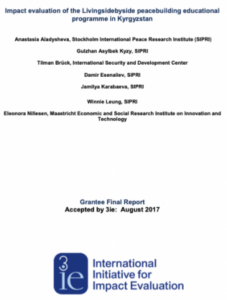This evaluation estimates the impact of a school-based peacebuilding educational training programme called LivingSideBySide’ (LSBS) implemented in 2014 and 2015 in southern Kyrgyzstan.
The impact evaluation tested the intergroup contact hypothesis and possibly underlying mechanisms related to (a) knowledge (b) attitudes and beliefs and (c) student’s behaviour towards peers, teachers, outsiders, and family members, such as increased interaction with others (including those of different ethnicities, which implies higher levels of trust, acquaintanceship and conflict avoidance and mitigation).
The study is seeking to assess whether these impacts differ with respect to gender and ethnic origin and whether certain impacts are more likely to spill over to non-treated persons than others. In addition, the evaluation looked at the sustainability of the intervention: do (some) impacts sustain beyond the duration of the programme?
The report finds a stronger support for a positive impact from the focus group discussions, where participants said they benefitted in terms of gaining more conflict-resolution skills, learning to accept different views and opinions, improved relations with family members or friends as well increased academic performance.
Publication Details
- Year of Publication: 2017
- Region/s: Central Asia
- Theme/s: Human Development · Impact Evaluation · Life in Kyrgyzstan
- Research Topic/s: Violence & Conflict · Youth & Children
- Method/s: Experimental Designs







